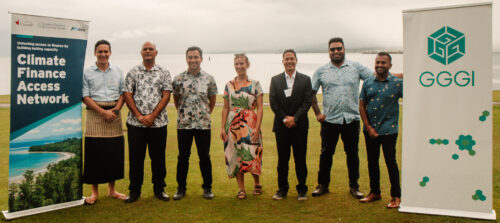
Unlocking Climate Resilience in Small Island Nations
CFAN Advisors in the Pacific have spent a year on the frontlines mobilizing millions in climate finance — and more is on the way.
Suva, Fiji – At a table, a man is busily writing in a notebook, a spreadsheet open on the computer beside him. Across the room, a woman is deep in conversation about how much catalytic financing is necessary before a project becomes bankable. Across the street, the guard changes at the Fijian Presidential State House.
The group in the room — with backgrounds ranging from fisheries to banking — have come together from across eight Pacific countries. They are here to do deep dives on the complex and sometimes baroque world of climate finance — how to plan, model, and pitch projects so that global climate funds and other donors will fund them and in so doing allow for the development of things like climate-smart agriculture. Or more stormproof harbors. They are here with the same goal: unlocking financial flows to enable the most climate vulnerable countries in the world — the small Pacific islands like Fiji, or its even smaller neighbor Tuvalu — to survive, and thrive, in a changing climate. They’re here for the annual CFAN Regional Pacific Writeshop.
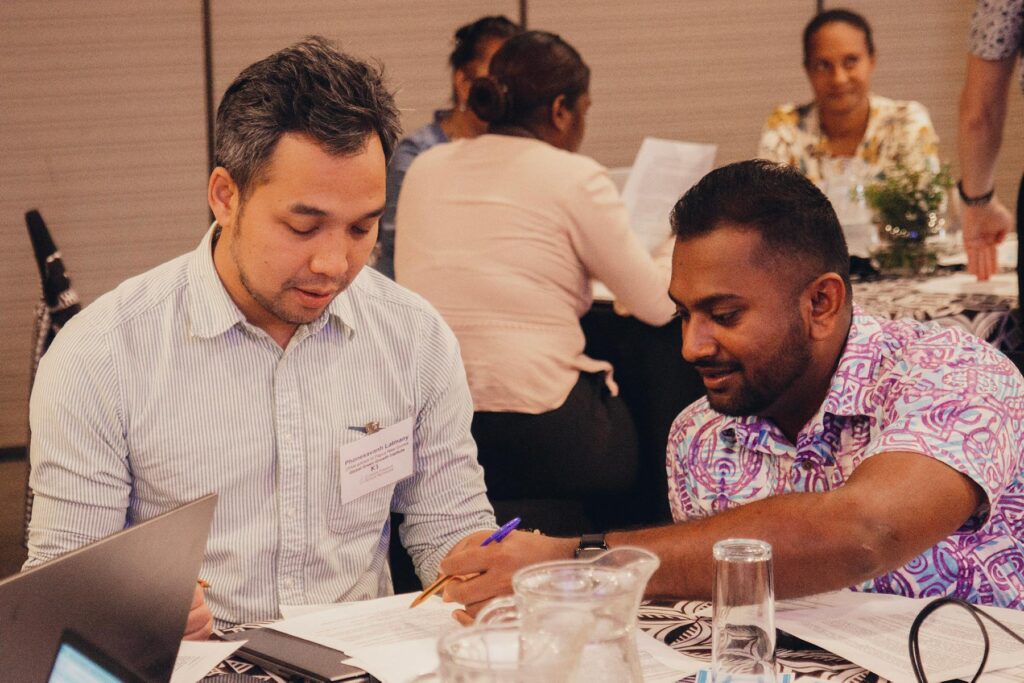
CFAN Advisors Phonesavanh Latmany and Shelveen Kumar collaborate on a training exercise.
How Did We Get Here?
Let’s back up.
The Climate Finance Access Network (CFAN), coordinated and hosted by RMI, was designed to navigate exactly that complex, bureaucratic system of climate finance the people in this room are dealing with. Developing countries in the Pacific have clearly identified that the biggest barrier to achieving their climate goals is accessing the finance they need — the finance they were promised — in a system where project approvals take niche expertise and often years. With the input of these countries, CFAN came to be a network that recruits, trains, and embeds climate finance advisors in host countries who have identified specific priorities for them to work on.
Seven of the people in this room represent CFAN’s first cohort of advisors, recruited and hired by CFAN’s Pacific implementation partner, the Global Green Growth Institute. These are individuals who are embedded in Fiji, Kiribati, Papua New Guinea, Samoa, the Solomon Islands, Tonga, Tuvalu, and Vanuatu; have undergone an intensive, multi-month training on every aspect of climate finance, stakeholder engagement, and finance structuring; and who have been working for the past year to get those projects going.
Others in the room represent the experts who’ve helped train them — experts in project structuring and financial modeling, like Marijian Gajšak of E Co, who leads the advisors in a live modeling exercise and whose colleague Grant Ballard-Tremeer later coaches them in how to pitch projects to funders. There’s also ‘Ofa Kaisamy of the Pacific Climate Change Centre who is here to present an overview of the adaptation finance in the Pacific so that advisors understand the regional landscape and the key national-level financial mechanisms they can utilize. The result is a combination of the deep financial and structural foundation advisors need to have as experts in this field, and a sophisticated understanding of the nuances presented by their region of focus.
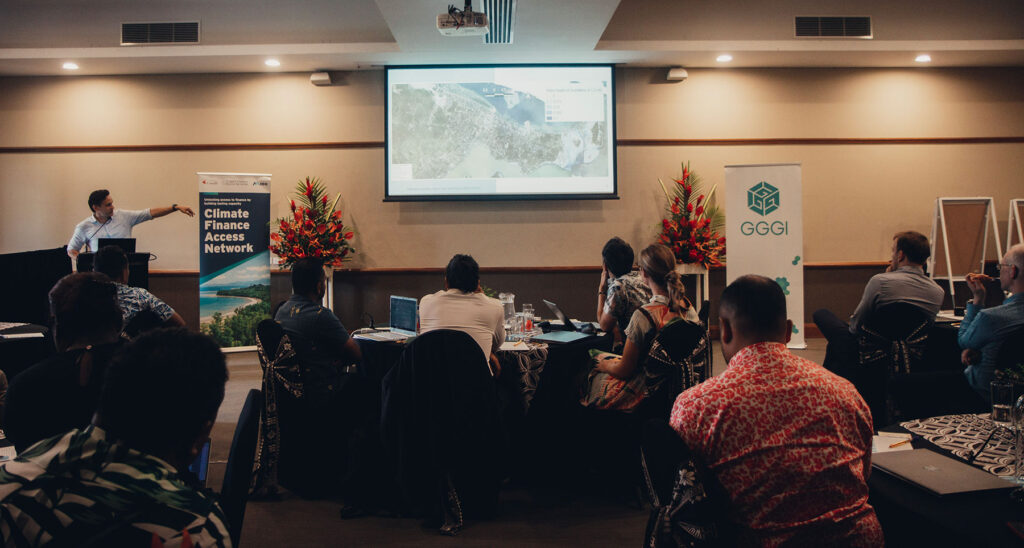
CFAN advisors present project pitches to regional stakeholders at the CFAN annual writeshop.
Every year the active cohorts of CFAN advisors come together with training partners, regional counterparts, and the staff of the network’s coordinating team for a “writeshop” — a chance to go deeper on key topics, practice their pitches, meet one-on-one with experts to refine their project proposals, find synergies with their peers’ projects, and enjoy the community of practice CFAN was designed to support.
A Pacific Proofpoint
The Pacific advisor cohort was CFAN’s first. With advisors starting in early 2022, these eight islands have been the proof point for what embedded advisory support can do, and what trained and resourced professionals dedicated to unlocking finance can accomplish. Because what they’ve accomplished is a lot — US$67 million in submitted project proposals, to be precise, with a total US$364 million under development. What this money represents is varied and impactful.
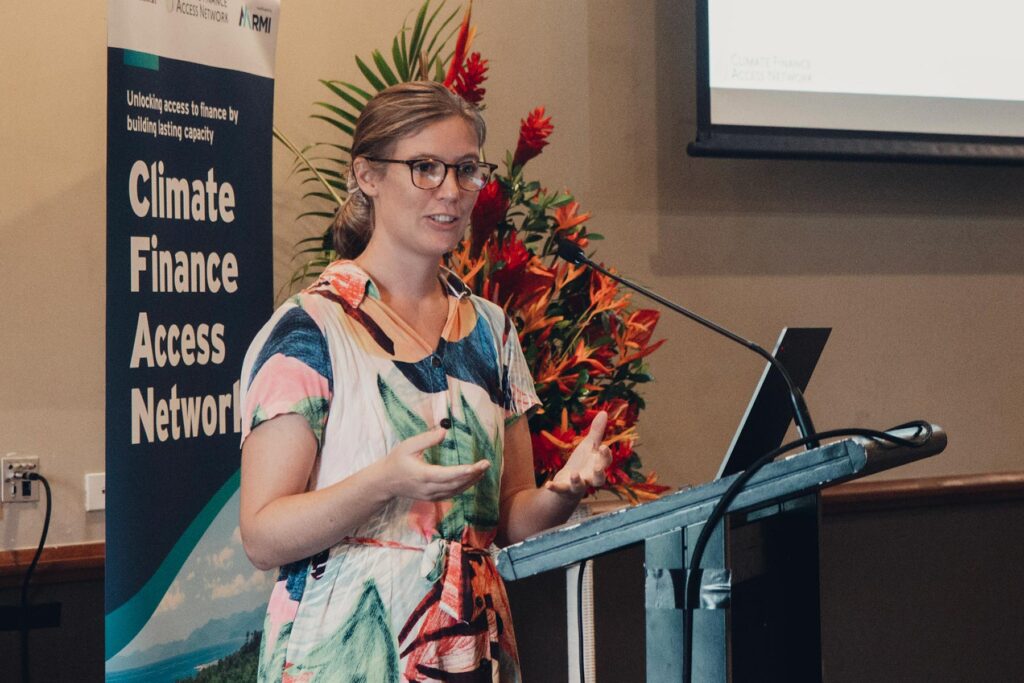
CFAN Advisor Charlie Sheppard pitches her project proposal on improving water security in Tuvalu.
In Papua New Guinea, CFAN advisor Phonesavanh Latmany had a project proposal approved by the Adaptation Fund this spring — a project that benefits 18,600 people directly and more than 87,000 indirectly through climate-resilient agricultural practice. He’s now working on a project proposal focused on nature-based solutions for building the climate resilience of coastal communities in the southern part of the country.
Meanwhile, Latmany’s colleague, Charlie Sheppard, is pitching a project to improve water security in Tuvalu, where impacts of climate change have threatened to diminish its already limited water sources. With no rivers or lakes on the islands, people depend on water drawn from natural aquifers and collected from rainfall. Sheppard’s proposal would aim to strengthen management of water resources and sanitation, invest in rainwater harvesting systems and backup water supply, and improve sanitation systems on outer islands.
Connection and Kava
The advisors talk and laugh among themselves. They prepare slides for their practice pitch sessions coming the next day. After the pitch session — which will open to a packed house and involve projects including green schools, coastal resilience, and forest regeneration — they will drink kava to celebrate this time together, what they have achieved, and what’s coming up. It is a moment that marks the community they have created and the ways it is about to grow.
Dr. Jale Samuwai, CFAN’s Pacific regional manager explains that a kava ceremony is a way to have real conversations — the kind of conversations that might not happen inside a conference space. “For us in the Pacific,” he says, “that’s where the real conversation is held — around the kava bowls.” It was around kava bowls that the idea of the Pacific Islands Forum Secretariat was formed. It’s a way to network and connect with people outside the formality of meeting rooms. Advisors and workshop participants will speak into the wee hours, having key conversations about project plans and ideas, breaking down barriers ahead of more formal meetings to come. This, Dr. Samuwai says, is what relationship building looks like.
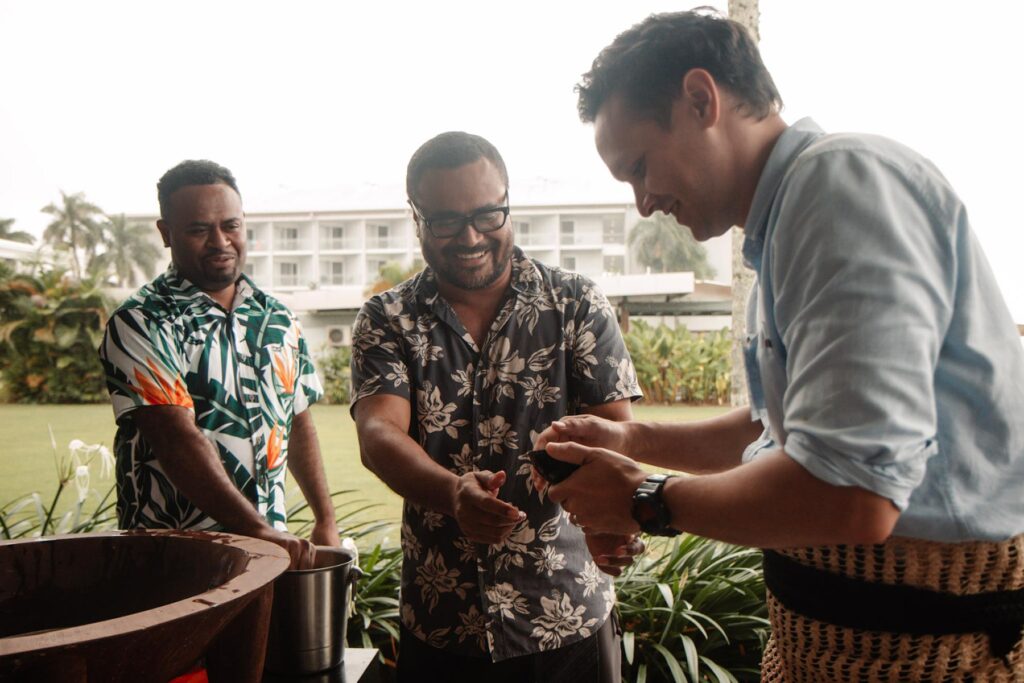
Aminisitai Delai of UNDP, Jale Samuwai of CFAN, and CFAN Advisor to Tonga Lano Fonua share a bowl of kava.
A Growing Community
While these seven CFAN advisors continue their work, more are on the way. Thanks to the successes in the Pacific, efforts are underway to extend the tenure of the current advisors and to add a second cohort representing four more advisors and countries. This second cohort will be supported by The Pacific Community (SPC), another CFAN implementing member that is already working closely with the network’s advisors. Global expansion is also in the cards, with cohorts planned in the Caribbean for later this year and in Africa next.
“We are incredibly proud of the Pacific cohort and all they have accomplished,” says Odgerel Chintulga, CFAN senior associate. “We knew that the CFAN model held tremendous potential, but there’s no way it could have been delivered at this scale without the skill and commitment of the advisors and the amazing network of countries and partners supporting them. And this is just the beginning.”